Chinese Proverbs // 9 of the Best Chinese Sayings PLUS a Bonus Quiz
Wisdom in Words: Unveiling the Meaning Behind 9 Intriguing Chinese Proverbs
While there are many sayings in English, Chinese proverbs are comparatively used much more frequently in everyday speech.
👉 These idioms are called chéngyǔ 成语.
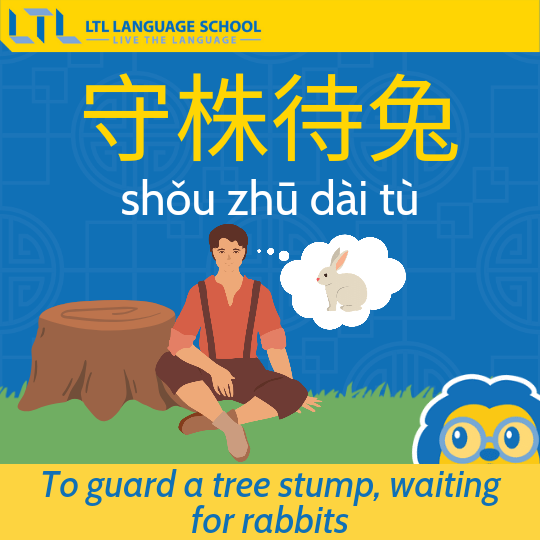
Chengyu are generally four characters long and have both a literal and metaphorical meaning.
To fit a full phrase into only four characters, usually a shorter form of a full, two-character word is used.
So when it comes to more complicated idioms, a new listener can’t generally hear and immediately understand, unless the meaning has been explained first.
Some chengyu are easier to understand or have direct English translations, but others don’t make sense at all unless you understand the story that the chengyu comes from.
Learning Chinese proverbs and integrating them into your speech and writing can take your Chinese to the next level and impress native speakers!
Also if you start spending your time on social media platforms such as Weibo for immersion, the content will take on a whole new life as you understand the deeper meaning.
In this blog, I’ll introduce you to several Chinese sayings/Chengyu that you can use in daily speech.
Chinese Proverbs || Proverbs with Direct Translations
Chinese Proverbs || Add Feet When Drawing a Snake (画蛇添足)
Chinese Proverbs || Mark the Boat to Find the Sword (刻舟求剑)
Chinese Proverbs || Guard the Stump Waiting For a Rabbit (守株待兔)
Chinese Proverbs || Return the Jade to the Zhao State (完璧归赵)
Chinese Proverbs || Imagine Plums to Quench Thirst (望梅止渴)
Chinese Proverbs || Playing with an Axe (班门弄斧)
Chinese Proverbs || Find Out More
Chinese Proverbs || FAQs
Oh before we start, to prove our dedication and love for Chinese sayings and the language we created this great “Chinese Proverb of the Day Generator”.
Check back each day to learn a new one!
Proverbs with Direct Translations
First, let’s start off with some easy ones! These chengyu have very direct translations in English.

Due to their familiar feel, these types of proverbs are much easier to integrate into speech and writing.
掌上明珠 (zhǎng shàng míngzhū)
掌: palm of the hand
上: on top
明珠: pearl
This translates literally into “a pearl in the palm of the hand”, but a better translation would really be “the apple of my eye”, referring to a beloved person. In Chinese, it is especially used to refer to daughters.
一石二鸟 (yī shí èr niǎo)
一: one
石: stone
二: two
鸟: bird
This idiom translates to, “one stone, two birds”, or “kill two birds with one stone”. The literal and figurative meanings are almost identical in Chinese and English!
种瓜得瓜, (zhòng guā dé guā)
种: to plant
瓜: melon
得: to get
This proverbs literally means, “plant a melon, get a melon”, but translates better into “you reap what you sow”.
It’s often used together with another phrase, 种豆得豆 (zhòng dòu dé dòu), which has the same meaning, but uses the character 豆, which means “bean“.
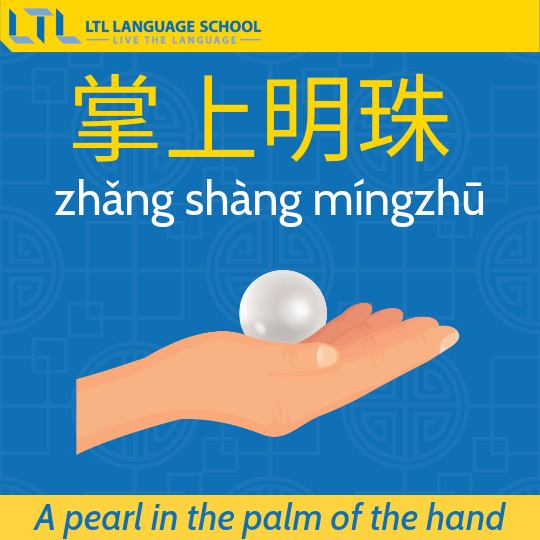
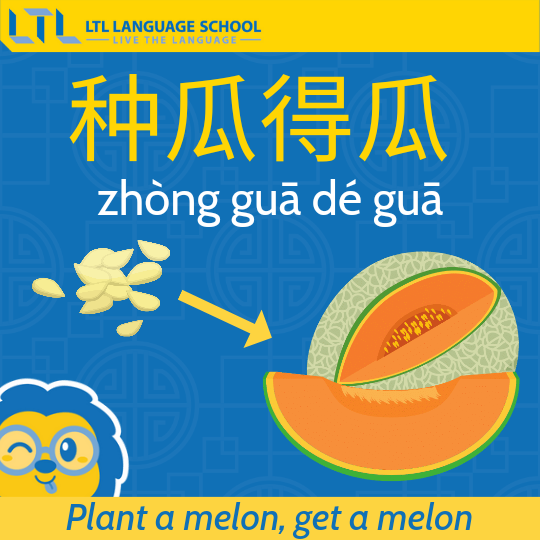
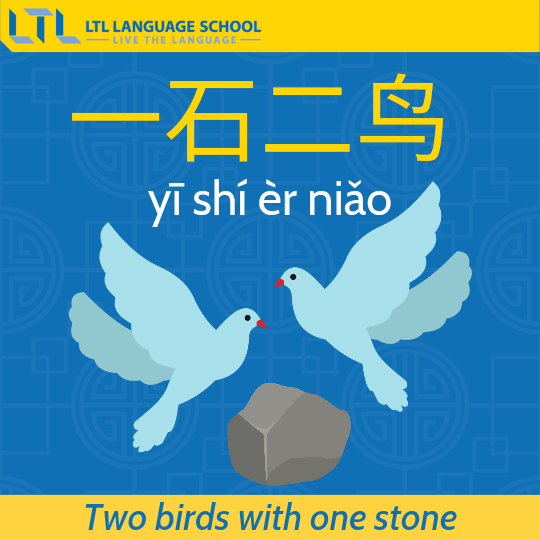
Complex Proverbs
Now we can get into some more interesting Chinese sayings and proverbs!
These idioms are more complex and have stories behind them. Using these when you talk would be especially impressive!
画蛇添足 (huà shé tiān zú)
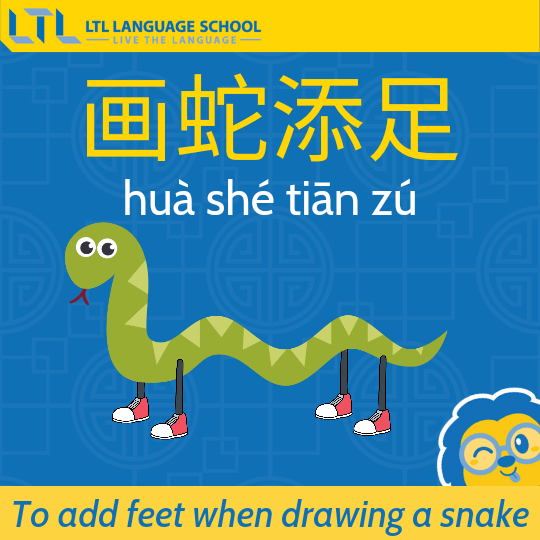
画: to draw
蛇: snake
添: to add
足 : foot
Literal meaning: add feet when drawing a snake
Figurative meaning: to ruin something by adding something superfluous or unnecessary
Story
As the story goes, there was once a man who was trying to share a bottle of alcohol among several people.
There wasn’t enough alcohol for every to drink, only enough for one person to drink and be satisfied.
So to decide who would get the alcohol, they held a contest. Whoever could draw a snake on the ground the fastest would get the alcohol.
One man drew his snake this fastest, and quickly grabbed the bottle of alcohol.
To prove his skill, he held the alcohol in his left hand, and with his right hand, he continued to draw–adding feet to his snake.
But before he finished drawing the feet, another person finished drawing his snake.
This person looked at the first man’s drawing and proclaimed, “Snakes don’t have feet! Why did you add feet to your drawing? The alcohol belongs to me!”
So the second man took the alcohol from the first and drank it.

Chengdu Street Food – 5 Must-Try Street Foods in Chengdu
Street Food in Chengdu – Five Of The Best Chengdu Street Food – oh it’s good! It’s so, so good! Sichuan province is famous for its food, it is the home of the comforting hot pot, after all. Yes, it…
This story was originally told by Chenzhen (陈轸) to Zhaoyang (昭阳), when China was broken up into seven different states. Zhaoyang was a general from the Chu State (楚国), sent by the Chu ruler to overtake cities in the Wei State (魏国).
Zhaoyang and his troops were extremely successful, conquering eight cities in the Wei State. After his success, Zhaoyang wanted to continue to the Qi State (齐国) and keep fighting, hoping to conquer more cities.
The ruler of the Qi State was worried, but luckily Chenzhen, an ambassador from the Qin State (秦国), decided to help him by talking to Zhaoyang himself.
Chenzhen told Zhaoyang the story of the snake-drawing contest, and advised him not to attack the Qi State.
He pointed out that if Zhaoyang succeeded, it wouldn’t bring much more glory or honour to his country, but if he failed, then all his previous efforts would have been wasted. Zhaoyang decided to heed his advice, and he returned home without attacking.
Examples
穿上西装还要戴两块手表,真是画蛇添足。
chuānshang xīzhuāng hái yào dài liǎng kuài shǒubiǎo, zhēn shì huà shé tiān zú.
Translation: To wear a suit and two wrist watches on top of that is really unnecessary.
对一个这样漂亮的女孩来说,化妆有些画蛇添足。
duì yī gè zhèyàng piàoliang de nǚhái lái shuō, huàzhuāng yǒuxiē huà shé tiān zú.
Translation: For such a beautiful girl, wearing makeup is not really necessary.
BONUS | Discover more about this Chinese proverb with our friend Anastaciia.
刻舟求剑 (kè zhōu qiú jiàn)
刻: to cut, carve, or engrave
舟: boat
求: to seek
剑: sword
Literal meaning: carve a notch on the boat to seek the sword
Figurative meaning: to take measures without regard to changes in circumstance; to do things rigidly without being flexible
Story
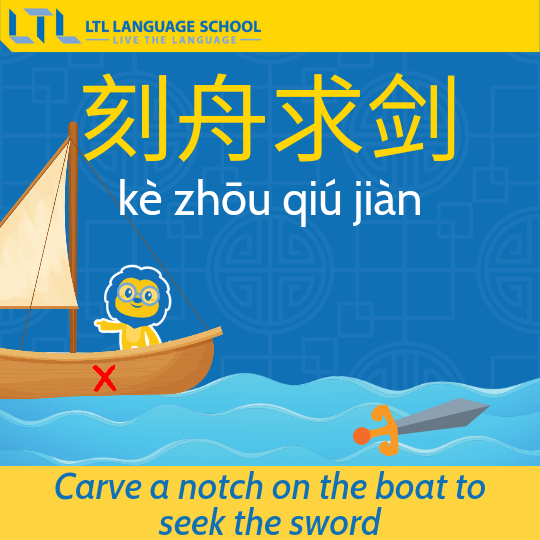
During China’s Warring States period, there was a man from the Chu State (楚国) who loved swordsmanship.
He always carried a sword on his body wherever he went.
This man was very inflexible in his thinking.
He did everything by the book–he practiced his swordsmanship exactly how his master taught him, and when he had a problem himself, he copied exactly how other people would solve the problem. He didn’t know how to be flexible.
One day, this man came across a wood cutter in the forest, chopping wood. As he watched, the wood cutter accidentally dropped his axe into a ravine.
But instead of panicking, the wood cutter calmly marked a spot on the mountain where his axe had fallen.
Then he climbed down, using the mark to guide him, and found the axe in the underbrush. The man from Chu State was very impressed by this and made a note to himself.
Later, the Chu State man was crossing a river on a ferry. As he was standing by the edge of the boat, he accidentally dropped his sword in the water.
The other passengers on the boat noticed and asked to stop the boat, so he could jump in and retrieve his sword.

However, the man declared that he had his own method of getting the sword back, and he proceeded to use a knife to carve a notch on the boat where he had dropped the sword in the water.
He then told the boatman to continue crossing the river, refusing the help of a young passenger who offered to retrieve the sword for him.
When the boat finally reached the shore on the other side, the man took off his clothes and jumped into the water to try to dredge up the sword.
He tried and tried but couldn’t find the sword.
Finally he said, “Obviously I dropped the sword here, why can’t I find it?”
The other passengers from the ferry saw him and started to laugh. The young passenger from earlier laughed the loudest and said, “The boat has already traveled so far, you can’t find the sword now! How could you mark the boat and hope to find the sword?”
Examples
时代变了,还按十年前的方法去做是不对的。这是刻舟求剑的想法。
shídài biàn le, hái ān shí niánqián de fāngfǎ qù zuò shì bùduì de. zhè shì kè zhōu qiú jiàn de xiǎngfǎ.
Translation: Times have changed, to continue doing things the same way as they were done 10 years ago is wrong. This is inflexible thinking.
解决问题要根据现实情况找出最合适的方法,不要刻舟求剑。
jiějué wèntí yào gēnjù xiànshí qíngkuàng zhǎochū zuì héshì de fāngfǎ, bùyào kè zhōu qiú jiàn.
Translation: In order to solve a problem, you need to find a suitable method based on the current situation, don’t ignore the circumstances.
守株待兔 (shǒu zhū dài tù)
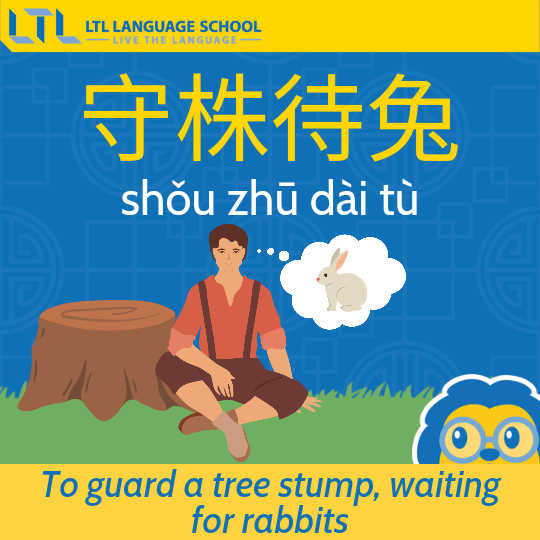
守: to guard, to stand watch over
株: tree stump
待: to wait
兔: rabbit
Literal meaning: to guard a tree stump, waiting for rabbits
Figurative meaning: to wait idly for opportunities instead of taking initiative; to trust things to chance
Story
Once, a long time ago, there was a farmer who made a living by tending his fields. One day, he was tilling his fields and became tired, so he sat down for a rest.
Suddenly, a rabbit came along and ran head first into a tree stump, killing itself.
The farmer was delighted; he took the rabbit home and ate it. Ever since that day, the farmer no longer did work.
Instead, all day he sat by the stump, waiting for a rabbit to run into it and die.
As he waited, his fields became overgrown, but he never saw another rabbit again.

HSK Prep // 11 Top Tips on Passing the HSK Exam (2023 Update)
If you are studying Chinese the HSK test is something you have probably heard of before. Many students ask what the best HSK prep is, let’s enlighten you.
Examples
我还是继续守株待兔吗?
wŏ háishì jìxù shŏu zhū dài tù ma?
Translation: Should I continue waiting around for something to happen?
他唯一做的就是守株待兔。
tā wéiyī zuò de jiùshì shŏu zhū dài tù.
Translation: The only thing he does is wait around for things to happen.
没有人能靠守株待兔取得成功。
méiyŏu rén néng kào shŏuzhūdàitù qŭdéchénggōng.
Translation: No one can depend on idle waiting to succeed.
完璧归赵 (wán bì guī zhào)
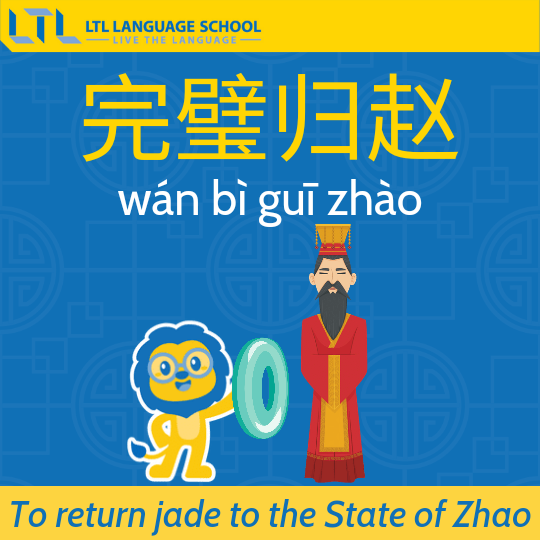
完: to finish, to be over
璧: special type of jade (a flat disk with a round hole in the center)
归: return
赵: Zhao (State)
Literal meaning: to return the jade intact to the State of Zhao
Figurative meaning: to return something perfectly intact to its rightful owner
Story
Long ago, during the time of the Warring States in China, the king of the Zhao State (赵国) obtained an extremely valuable piece of jade, which he cherished.
When the king of the Qin State (秦国) heard about this, he became envious and wanted the jade for himself.
So he sent an ambassador to the Zhao State, promising to exchange 15 cities in return for the piece of jade.
The Zhao State King knew that the Qin State King was trying to trick him, but he was also afraid that if he didn’t comply with the Qin King’s demands, then the Qin State would attack the Zhao State.
So the Zhao King and his advisors discussed among themselves, but they couldn’t come up with a surefire plan. The king was very nervous.
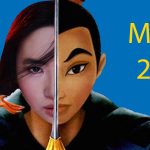
Mulan (2020) || Feminist Remake and Cultural Homage
This is it, Mulan 2020 the live action movie will be out in theatre soon. Find out how Mulan is a feminist movie and important for Asian representation.
During this time, a man named Lin Xiangru (蔺相如) was recommended to him. This man was said to be brave and clever. So the king immediately summoned him and asked for his advice.
Lin Xiangru told the king,
“If you don’t agree to the Qin State’s demands, then the blame will be yours. But the Qin State has promised to give you 15 cities, so if they don’t, then the blame will be theirs. If you trust me, give me the jade. I will meet with the Qin King. If he truly intends to keep his word, I will give him the jade in exchange for the cities. But if he doesn’t plan to give you the cities, I promise I will return the jade safely to you.”
Having no better plan, the Zhao King agreed. Lin Xiangru traveled to the Qin palace and presented the jade to the king.
The king turned it over and over in his hands, admiring it. His advisors were also eager to look at the jade and pass it around, congratulating the king in unison.
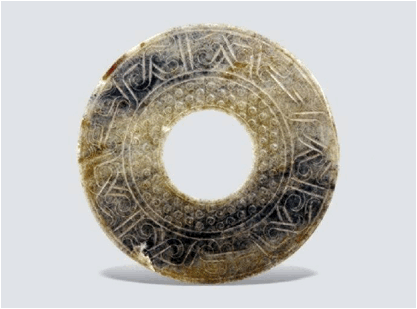
Lin Xiangru stood to the side for a long time.
The Qin King didn’t mention anything about the cities he was supposed to give to the Zhao King.
Lin Xiangru realized that the Qin King was tricking them and never intended to give them the cities.
So finally, Lin Xiangru said,
“This piece of jade has a small flaw, give it to me, and I will point it out to you.”
The Qin King believed him and handed him the jade. Once he had the jade, Lin Xiangru held it close to his chest and backed up, leaning against a pillar.
He angrily told the king,
“When ordinary people make friends, they know that honor is important. But you, as the prestigious king of a great nation, have received this jade sent by the Zhao King, and you haven’t even once mentioned the cities you agreed to give us. So I will take this jade and go back home. If you try to steal the jade from me, I will smash it against this pillar!”
Upon hearing this, the Qin King hastily tried to persuade Lin Xiangru. In insincerity, he ordered a map to be brought out, so he could show the cities to Lin Xiangru. He agreed to comply with Lin Xiangru’s demands by fasting for five days, then holding a grand ceremony to formally conduct the exchange.
But Lin Xiangru could tell that the King wasn’t telling the truth, and that he would break his promise. So that very night, he disguised one of his trusted aides as an ordinary person and sent him back the Zhao State with the jade.
On the day of the celebration, he told the Qin King,
“I have already sent the jade back to the Zhao State. If you are sincere in your promise, first give us the 15 cities, and I will immediately have the jade sent to you. If not, even if you kill me, it will be pointless. I’ve only done this because I was forced into this situation.”
The Qin King was furious but had no other options. He could only send Lin Xiangru home.
So the jade was sent back to the Zhao State, whole and complete.
Examples
你放心,你那两件东西不久就会完璧归赵。
nĭ fàngxīn, nĭ nèi liăngjiàn dōngxī bùjiŭ jiù huì wán bì guī zhào.
Translation: Don’t worry, I’ll bring these two things back to you, safe and sound, in no time.
我会把它完璧归赵的!
wŏhuì bă tā wán bì guī zhào de!
Translation: I will bring it back safe and sound!
望梅止渴 (wàng méi zhǐ kě)
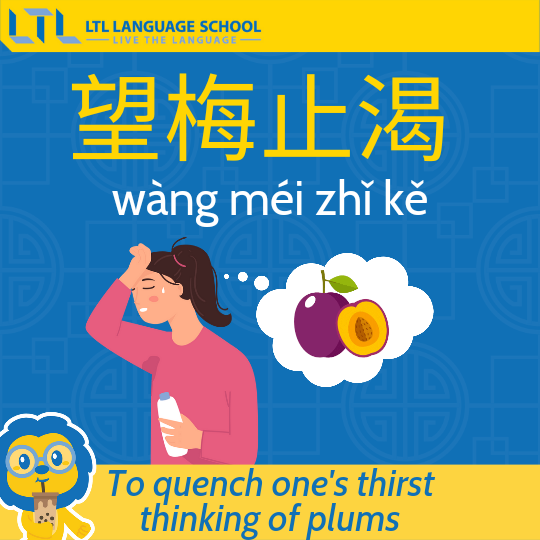
望: to expect, to hope
梅: plum
止: stop
渴: thirsty
Literal meaning: to quench one’s thirst by thinking of plums
Figurative meaning: to console oneself with illusions or fantasies
Story
In ancient China, there was a man name Caocao (曹操). He was a very resourceful statesman and general.
When he led his troops to battle, he had quick wits and often won by taking his enemy by surprise.
One summer day, Caocao was leading his his troops on an expedition. On this particular day, the sun was scorching hot, and the heat pressed down on the soldiers.
They had already spent half a day without a drop of water, and many of them were so thirsty they couldn’t go on. The farther they marched, the slower they became.
When Caocao realized this, he ordered his men to stop and sent someone to find water.
But they were in the middle of the wilderness, and there were no rivers or ponds. The ground was so dry that it was cracked open.

Caocao was very worried. But suddenly, he had an idea! He leapt off his horse and shouted, “Water, water!”
Upon hearing him, his soldiers’ energy immediately returned, and they looked around, asking, “Where?“
Caocao replied, “Ahead of us I see a plum tree forest. The plums should be ripe right now. When we reach the forest, everyone can eat to their heart’s content!”
When the soldiers heard Caocao, they immediately began to think of the sweet and sour taste of the plums, making them salivate.
As they salivated, they didn’t feel as thirsty as before. The soldiers pulled themselves together and strode quickly forward.
Finally, they left the wilderness behind them and found a place with water.
Examples
懒惰的他对成功成天空想, 望梅止渴.
lǎnduò de tā duì chénggōng chéngtiān kōngxiǎng, wàng méi zhǐ kě.
Translation: As a lazy person, he daydreams about success all day, comforting himself with fantasies.
如果再不开始行动, 我们对参赛并拿奖的愿望只能望梅止渴了.
rúguǒ zàibù kāishǐ xíngdòng, wǒmen duì cānsài bìng ná jiǎng de yuànwàng zhǐnéng wàng méi zhǐ kě le.
Translation: If we don’t start to take action, our dream of winning the competition will just be a fantasy.
班门弄斧 (bān mén nòng fŭ)
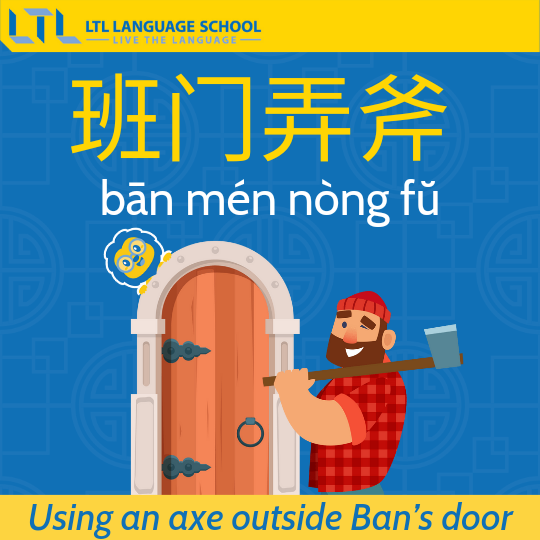
班: (in this case, a surname)
门: door
弄: play with
斧: axe
Literal meaning: using an axe outside Ban’s door
Figurative meaning: not to overestimate their own abilities.
Story
This idiom is used to remind people not to overestimate their own abilities.
What is this idiom about?
Ban (班) is, in this case, actually a surname. Master Lŭ Bān was an expert craftsman in ancient times.
One day a young carpenter came to his neck of the woods carrying a hatchet (you know, as one does). This young guy starts bragging how amazing and great he is at making and building things.
Someone who was near asked him if he could maybe make a nice, wooden door like the one of Lu Ban’s. Once he heard whose door it was, the young carpenter’s face turned red and he excused himself, saying he had other business.
He did not want to compete with master Lu Ban’s skills. So this is how the idiom “班门弄斧” came into existance.
This phrase can also be used to show respect to someone, in the meaning of doing something or making something in front of you is like “using an axe in front of Ban’s door”.
Or maybe – speaking Chinese in front of a native speaker is like “using an axe in front of Ban’s door”.
Examples
在你面前这样班门弄斧,真是不好意思。
Zài nǐ miànqián zhèyàng bānménnòngfǔ, zhēnshi bù hǎoyìsi.
Translation: Showing off in front of you like that, I’m really embarrassed. (this is used when the person you’re speaking to is skilled at whatever you are doing)
他在美国呆过十年,你教他英语,那是班门弄斧.
Tā zài měiguó dāiguò shí nián, nǐ jiào tā yīngyǔ, nà shì bānménnòngfǔ.
Translation: He used to stay in USA for ten years, you wanna teach him English? It’s like teaching a fish to swim.

Immersion Training – How to Really Immerse Yourself
Immersion Training – 100% Immersion into Chinese culture while travelling If you didn’t know already LTL stands for “Live the Language”. LTL is based on immersion and the practice of immersion training. Today, our friend Callan tells us the best…
Find More Chinese Proverbs & Stories!
If you’re interested in more stories like this, all of the stories from this blog post were translated from a book called…
中华成语故事 (Zhōnghuá chéngyǔ gùshi, or Chinese Proverb Stories).
The chief editor/author is 崔钟雷 (Cui Zhonglei).
You can buy the the book here, or try to find it at a library!
If you can’t find this exact book, there are plenty other books that explain the stories that Chinese sayings and proverbs come from.
ALSO…
Feeling ready to try your hand at a Chinese Proverbs quiz?
We’ve prepared a super, quick quiz to see how much you really know about Chinese Proverbs.
Take our quick-fire Chinese Proverbs quiz here.
AND FINALLY…
If that wasn’t enough we have WAY more content on Chinese proverbs, sayings and the language itself… here’s just a few.
| Blog Post |
|---|
| More Popular Chinese Proverbs |
| Chinese Proverb of the Day |
| What is Mamahuhu? |
| Discover Chinese Slang |
| Game of Thrones in Chinese |
Got anymore to share with us? What other Chinese stories have you heard? Let us know in the comments below!
Learning proverbs is a really fun way to discover deeper meanings when studying a language.
On that note, we think you might like these too:
- 10+ proverbs and idioms that Italians use everyday
- The most commonly used Korean proverbs
- 10+ Russian proverbs and idioms natives use everyday
Chinese Idioms || FAQs
What is “Mamahuhu”
What is a Chengyu?
While there are many sayings in English, Chinese proverbs are comparatively used much more frequently in everyday speech.
These idioms are called chéngyǔ 成语.
How do you say proverb in Mandarin?
Proverbs in Mandarin Chinese is 谚语 yànyŭ.
Should I learn proverbs in Chinese?
When getting to more advanced stages of Mandarin it is certainly useful to learn them.
Chengyu come up everyday in Chinese speech and without understanding them, often the literal meaning makes no sense (which can be said of English proverbs also of course) so this makes understanding certain sentences very difficult.
By learning a few as you go along, this can great enhance your Chinese proficiency.
Where did the first Chinese proverbs come from?
Many of the earliest and most well-known Chinese proverbs are attributed to the famous philosopher Confucius.
Want more from LTL?
If you wish to hear more from LTL Mandarin School why not join our mailing list.
We give plenty of handy information on learning Chinese, useful apps to learn the language and everything going on at our LTL schools!
Sign up below and become part of our ever growing community.
BONUS | Want to study Chinese free? Grab a 7 day free trial with LTL Flexi Classes.
![[𝗢𝗟𝗗] LTL Chengdu Logo](https://old.ltl-chengdu.com/wp-content/sites/25/logo-ltl-header.png)





9 comments
Love these. I think when you get to a stage of knowing a good amount of vocab then learning chengyu and idioms is the best way to learn chinese.
I never quite realised how deep you can go with them. I actually use 一石二鸟 all the time but got it confused before because we say two birds first in English!
Yes there’s so many to discover. Learning Chinese never truly stops and Chengyu is one of the reasons for that!
Also great you are learning them Gail, it’s a great way to show natives your level is strong!
Max, Gail, can you recommend any books that explain chengyu for an advanced learner of Chinese? I have several reference books of idioms and proverbs but they mostly just give explanation and background on the meaning, what’s missing is example conversation where these can be used. This is what I’m really looking for. Thank you.
Hi Filip,
Yes sure.
《爆笑成语 看漫画学成语》would be our first recommendation for what you are after
《中国成语大会》is another great choice
I think these two should keep you busy for the near future!
Keep studying these Chinese Idioms Filip! It’s a great way to learn Chinese
LTL
[…] Two birds, one stone! […]
[…] https://old.ltl-chengdu.com/chinese-proverbs-sayings/ some nice examples. […]
Could you also tell us the meaning of this Chinese proverb: “If I die beneath a peony, I’ll still be charming as a ghost.” (牡丹花下死,做鬼也风流)
Hi Anne, it’s along the lines of liking someone for their beauty so much that even death is worthy. Hope that makes sense!
I have found your website very helpful!
Please explain the following proverb:
“Better to sit all night than to go to bed with a dragon.”